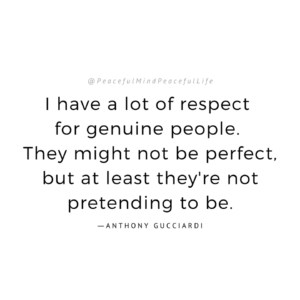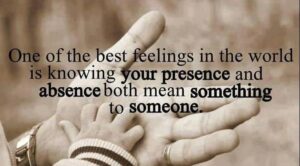Word-Of-the-Week #995: Genuine
August 31, 2023 by Susan Clarke · Comments Off on Word-Of-the-Week #995: Genuine
Genuine – not pretended; sincerely felt or expressed.
How good are you at engaging in active listening? Do you give your undivided attention and show genuine interest?
This week features the first part from “If someone displays these 8 behaviors, they have a genuine heart,” by Lachlan Brown, from HackSpirit.
In a world full of filters and online personas, spotting someone who’s genuinely real can feel like a challenge.
But genuine people are out there, and they stand out not just by what they say, but how they behave.
They aren’t always just smiles and kind words; genuine hearts combine honesty with kindness, strength with openness.
Wondering how to recognize such people?
Or maybe curious if you’re one of them?
I’m going to break down the 8 behaviors that highlight a truly genuine heart.
Read on and see how simplicity and authenticity can shine even in today’s complex world.
- Active Listening
One of the most telltale signs of a genuine heart is the ability to truly listen.
We’re not just talking about nodding along or hearing words.
Genuine individuals engage in active listening.
They give their undivided attention, making eye contact, responding appropriately, and showing genuine interest in what’s being said.
In an era of constant distractions, where everyone’s in a hurry to put forth their viewpoint, someone who takes the time to really hear you out is like a breath of fresh air.
These individuals don’t just wait for their turn to speak; they immerse themselves in your words, seeking to understand rather than to reply.
And in that act of genuine listening, they show that they value and respect you.
- Consistent Authenticity
I remember an old friend from my school days, Jamie.
Whether he was around the popular group or just hanging out with a couple of us on the fringes, Jamie was always… well, Jamie.
There was no shift in persona depending on his audience.
He would crack the same goofy jokes, share his genuine thoughts, and never felt the need to put on a facade just to fit in.
This behavior, my dear readers, is the mark of someone with a genuine heart.
They don’t have a “social mask” they wear in one setting and a different one for another.
They are consistent in their authenticity. It’s a refreshing quality, isn’t it?
In a world where many people contort themselves to fit various molds, genuine-hearted folks remain steadfast in being true to who they are, no matter where they are or who they’re with.
Their authenticity is their signature, and it’s as reliable as a favorite old tune.
- Embracing Vulnerability
Now, this one might catch you off guard. In a society that often equates strength with stoicism and unflappability, here’s a twist: genuine-hearted people aren’t afraid to show their vulnerable side.
It sounds counterintuitive, right? We’re taught to wear armor, to be invincible, and to never let ’em see you sweat.
But those with genuine hearts understand something profound: there’s immense strength in vulnerability.
They know that admitting when they’re wrong, asking for help, or sharing their fears doesn’t make them weak.
On the contrary, it takes guts to say, “I don’t know,” “I’m scared,” or “I messed up.”
By doing so, they not only build authentic connections but also pave the way for others to be real, too.
After all, it’s in our shared vulnerabilities that some of the most genuine human connections are formed.
So next time you see someone openly wearing their heart on their sleeve, know that it’s not a sign of weakness, but a testament to their genuine strength.
This week’s focus is all about being genuine. Do you display consistent authenticity? Are you comfortable being who you are at home and at work? Can you embrace vulnerability and ask for help when needed?
I LOVE feedback! Join my Facebook community on my FUN-damentals Fan Page.
Word-Of-the-Week #994: Legacy
August 24, 2023 by Susan Clarke · Comments Off on Word-Of-the-Week #994: Legacy
Legacy – what you leave people with.
How do you want to be remembered? Is it simply a memory or a profound impression? Are your achievements extraordinary and lasting?
This week features two excerpts from “What Type of Legacy Do You Want to Leave?” by Bruna Martinuzzi, sharing ways you can have an impact after you’re gone.
“A legacy isn’t only about leaving what you earned but also what you learned.
“If I am not for myself, who is for me? And when I am for myself, what am I?” is the well-known aphorism from Hillel, a famous Jewish rabbi. Throughout history, we have been conditioned to look out for ourselves, or no one else will. But if we’re consumed with pursuing only our selfish interests, what are we? And more important, what legacy will we leave?
There’s a lot of criticism today about people’s lack of civic responsibility, but stories of altruism and generosity also abound. For example, there are countless people who abandon a comfortable lifestyle to help those during major disasters. And more and more, we see people who want to make a difference, who are looking to leave a positive imprint on the world and a legacy of goodness.
But a legacy isn’t only about leaving what you earned but also what you learned, and we all have an opportunity to make a difference. It doesn’t call for wealth, fame or even taking giant steps—you don’t have to be a Gandhi or a Martin Luther King to leave a positive mark right now, one that will linger long after you’re gone.
So where can you start?
- Identify What Matters to You
What’s important to you? What are your values? How do you want your life to touch others? What would make you proud? If you had to do one thing to improve your world, what would your contribution be? How can you increase the well-being of those who depend on you? How can you leave your mark on whatever you do?
The answer to these introspective questions will help you develop a meaningful philosophy of life that goes beyond just creating financial wealth. Your words become the building blocks of your legacy. Knowing what’s important, what drives you and how you want to be remembered creates tremendous clarity in how you should live your life.
As Jim Kouzes and Barry Posner remind us in “A Leader’s Legacy,” by asking ourselves how we want to be remembered, we plant the seeds for living our lives as if we matter.” Considering your legacy gives you a compass to help you move with purpose and determination even in the most uncertain times. Creating a legacy statement will help you commit to what you wrote down and live your life in line with your higher values.”
- Live Your Life as a Mensch
When Robin Williams died, Steve Martin called him “a mensch.” It’s safe to say that everyone considered Robin Williams not only to be a very funny man but also one of the kindest. Calling him a mensch is the greatest eulogy because a mensch is a person who is decent and honorable, a person of high integrity who has genuine caring for his fellow man. A mensch always looks for an opportunity to do good in life, to be of help to others and to give without regard for anything in return. A mensch doesn’t cut corners in their relationships with people. You always feel safe in the presence of a mensch because you instinctively know that they will not deceive you, undermine you or diminish you in any way. Being called a mensch is the ultimate compliment you can receive.
Strive to live your life as a mensch, and you’ll have left your greatest legacy for anyone who has come in contact with you. For pointers on being a mensch as an entrepreneur, watch entrepreneur Guy Kawasaki’s talk at Stanford University’s Entrepreneurship Corner.
The third question from Rabbi Hillel’s famous quote is, “If not now, when?” It’s never too soon to start your legacy—to pursue both success and significance. What is one step you can take today?
This week’s focus is all about your legacy. Do you want to leave this world knowing that you made a difference? Are you looking to leave a positive imprint and a legacy of goodness? Would your peers call you “a mensch”?
I LOVE feedback! Join my Facebook community on my FUN-damentals Fan Page.
Word-Of-the-Week #993: Considerate
August 17, 2023 by Susan Clarke · Comments Off on Word-Of-the-Week #993: Considerate
Considerate – showing regard for the needs or feelings of others.
Do you know how you tell when someone is being genuinely nice?
This week features the 2nd half of “If someone uses these 7 phrases, they’re only pretending to be polite,” by Tina Fey at HackSpirit.
To Recap:
1) “No offense, but…”
2) “I’m sorry you feel that way”
3) “Do you need any help?”
4) “Bless your heart”
5) “It’s not for everyone”
This phrase can be tricky. On the surface, it seems respectful, understanding, even validating. It acknowledges that everyone is unique and different things suit different people.
However, in a certain context or tone, it can also be a way to express criticism or disapproval.
Someone saying, “It’s not for everyone” could really mean, “I don’t like this, and I’m subtly suggesting that you, or your work, doesn’t meet a certain standard.”
You can’t really challenge it because technically, it’s a fair statement. But the underlying message can feel dismissive or belittling, turning it into a polite put-down.
Not so long ago, I created a small art exhibition at our local community center. An acquaintance, after spending a considerable amount of time observing my work, turned to me and said, “Well, it’s not for everyone.”
I was a bit taken aback. The phrase was innocent enough, but the context and their tone suggested it was a thinly veiled critique.
They weren’t saying my art was unique or different – they were saying it didn’t appeal to them, or maybe most people.
When being truly polite, it’s important to communicate criticisms constructively and directly — or say nothing at all.
6) “You’ll do better next time”
Here’s something you may hear people say when you feel down because you didn’t do well at something.
At my previous job, I was very hard on myself especially when I was new. I would analyze every presentation or project I did and find dozens of mistakes in them.
There were two colleagues in particular I shared my worries with. And I noticed what a huge difference there was in their reaction.
One of them took the time to talk to me about what exactly I felt bad about, and how I could try to improve it.
And the other one just listened, nodded, and made a comment like “You’ll do better next time.”
Sure, it was polite on the surface, and maybe this colleague truly meant well. But, I had the impression like they were just trying to end the conversation and didn’t really care whether I did better or not.
Because there was no effort behind her words. When a person really wants to be nice, they’ll show it to you through action and not just nice-sounding phrases.
7) “That sounds interesting”
I have to admit something: I’ve used this phrase hundreds of times. In fact, I dare say I still do.
And to be honest? I try my best to always be a kind person, but the truth is that sometimes I do use this phrase just because it sounds polite.
I don’t have energy to think of something more thoughtful or specific to say, so I just fall back on phrases like this that work for practically any situation.
And sometimes I could tell it in the person’s face. They were expecting a comment with more substance, or maybe even just a more enthusiastic tone, and I disappointed them.
Since then I’ve made sure to avoid this phrase, and instead take the time to understand what the person is saying more deeply. As a result, I can always find something more meaningful to say in response.
How you can tell when someone’s truly kind and polite
Now you know 7 phrases that people use when they’re only pretending to be polite.
So now you might wonder, how can you tell when someone is genuinely nice?
It’s pretty simple. It’s not just about saying the “right” things — it’s about true consideration and respect for others.
This doesn’t depend on any specific way you word something, but through the way you approach the conversation, your ability to listen and empathize, and the care you put into the interaction.
It’s important to listen carefully and critically to what people say and how they say it. Because words can seem harmless on the surface, the real intention often lies beneath.
Let’s strive for a world where politeness isn’t a mask to hide behind, but a genuine display of empathy, kindness, and understanding.
This week is all about being considerate. How often do you show regard for the needs and feelings of others? Do you feel your thoughts/feedback are respected at work? Are you able to communicate any criticisms constructively and directly?
I LOVE feedback! Join my Facebook community on my FUN-damentals Fan Page.
Word-Of-the-Week #992: Polite
August 10, 2023 by Susan Clarke · Comments Off on Word-Of-the-Week #992: Polite
Polite – mindful of, conforming to, or marked by good manners.
How does it feel when you are mindful of someone else and show good manners? How does it feel when people treat you politely?
This week features the 2nd half of “If someone uses these 7 phrases, they’re only pretending to be polite,” by Tina Fey at HackSpirit.
“Have you ever left a conversation feeling vaguely uncomfortable?
On paper, there was nothing wrong with the conversation. In fact, everything they said was very nice and polite.
So what’s going on here? Are you overthinking things when there’s no real issue?
Or maybe you’re picking up on someone who’s only pretending to be polite.
How can you tell if that’s the case? After analyzing the people I know and interactions I had with them, I’ve narrowed it down to 7 key phrases.
If you notice someone using these a lot, there’s a good chance they’re only pretending to be polite.
1) “No offense, but…”
We’ve all heard this phrase. It’s a classic, typically used when someone is about to say something that they already know might offend you. Despite the preface, it’s rarely used in genuinely polite conversation.
A person using “no offense, but…” is, in effect, giving themselves a free pass to make a potentially insulting comment.
They’re acknowledging that their words might upset you, but instead of putting in effort to find a more compassionate way to say it, they’ve decided to say it anyway.
The irony of this phrase is hard to ignore. By claiming not to intend offense, the speaker shifts responsibility for any hurt feelings onto the listener, as if it were your fault for taking offense.
I heard this quite a lot in a recent online course I was a part of. During peer review, one member would start his sentences with “No offense, but..” and then he would give a rather harsh critique to another participant’s project.
It was rather uncomfortable for anyone involved. If you find yourself tempted to use this phrase, it’s a sign that there could be a kinder way to say what you want to say.
2) “I’m sorry you feel that way”
Ah, the pseudo-apology.
On the surface, it seems like an attempt at empathy and understanding. But in reality, “I’m sorry you feel that way” is often a veiled attempt at deflecting blame and responsibility.
Instead of offering a genuine apology for their actions, the person is merely expressing regret over your emotional response. It’s a subtle shift, but it places the responsibility of the conflict onto the receiver, not the issuer of the statement.
Basically, they’re saying, “I’m sorry that you’re upset,” not, “I’m sorry for what I did to upset you.” In other words, this phrasing suggests that the real problem is your feelins, not their actions.
At my previous job, I had a situation with a co-worker where we disagreed on a project approach. When I expressed my concerns over his method, his response was, “I’m sorry you feel that way.”
That phrase did nothing to address the issue at hand. Instead, it left me feeling dismissed and unheard.
Remember, genuine politeness means listening, empathizing, and when necessary, owning up to our actions.
3) “Do you need any help?”
And now we come to the fake offer for help.
You’ve surely heard this from a seemingly nice passerby or stranger. I witnessed it just a few days ago in a grocery store parking lot.
A woman’s bags ripped and all the contents of it spilled onto the ground. A young man walking by asked, “Do you need any help?”
So here’s why this is often just someone pretending to be polite. The way it’s phrased practically encourages the person to politely decline.
Saying yes would make them feel like they’re inconveniencing the person asking, or having to admit that they need help, which can make them uncomfortable.
And in fact, the woman in the parking lot answered with “Oh I’m fine, thank you.”
A genuinely kind offer would sound like “May I help you?” or “Please let me help you.” Or, you would simply help without even asking — it’s pretty obvious the person could use a hand.
4) “Bless your heart”
Here’s a phrase that’s very popular especially in the south of the US.
While it can be a genuine term of sympathy or endearment, it’s often used as a passive-aggressive insult, typically when the speaker believes the person they’re addressing has done something foolish or naive.
Instead of directly stating their disapproval or disbelief, the speaker sugarcoats their criticism with this seemingly kind phrase. It’s polite mockery masquerading as concern.
Last year, during a family reunion, I suggested a new way to organize our yearly holiday gift exchange.
An elder cousin responded with a sweet smile, “Bless your heart, always trying to fix things that aren’t broken.”
At that moment, the phrase wasn’t a compliment to my initiative but a polite jab at my perceived naivety. It left an undercurrent of negativity beneath the polite veneer.
So remember, politeness isn’t just about the words we use but also the intent behind them. Truly polite people use their words to uplift others, not to subtly bring them down.
This week is all about being polite. Are you a good listener? How easy is it for you to feel empathy for someone? Are the words you choose uplifting to others?
I LOVE feedback! Join my Facebook community on my FUN-damentals Fan Page.
Word-Of-the-Week #991: Hospitality
August 3, 2023 by Susan Clarke · Comments Off on Word-Of-the-Week #991: Hospitality
Hospitality – kindness in welcoming strangers or guests.
Bill Marvin, the Restaurant Doctor, featured this in his weekly journal.
#22: Small Gestures, Big Payback
[by Rick Phillips, taken from Chicken Soup for the Soul at Work, Copyright 1996 by Jack Canfield, Mark Victor Hansen, Martin Rutte, Maida Rogerson & Tim Clauss]
I do a lot of management training each year for a national chain of convenience stores. Among the topics we address in our seminars is the retention of quality employees — a real challenge to managers when you consider the pay scale in the service industry.
During these discussions, I ask the participants, “What has caused you to stay long enough to become a manager?” Some time back a new manager took the question and slowly, with her voice almost breaking, said, “It was a $19 baseball glove.”
Cynthia told the group she originally took a Circle K clerk job as an interim position while she looked for something better. On her second or third day behind the counter, she received a phone call from her nine-year old son, Jessie.
He needed a baseball glove for Little League. She explained money was very tight for a single mother and her first check would have to go toward paying bills. Perhaps she could buy his baseball glove with her second or third check.
When Cynthia arrived for work the next morning, Patricia, the store manager, asked her to come to the small office in back of the store. Cynthia wondered if she had done something wrong or left some part of her job incomplete from the day before. She was concerned and confused.
Patricia handed her a box. “I overheard you talking to your son yesterday,” she said, “and I know it’s often hard to explain things to kids. This is a baseball glove for Jessie because he may not understand how important he is to you, even though you have to pay bills before you can buy gloves.”
“You know we can’t pay good people like you as much as we’d like to, but we do care, and I want you to know you are important to us.”
The thoughtfulness, empathy and love shown by this convenience store manager demonstrates vividly why people remember more how much an employer cares than how much the employer pays. An important lesson for the price of a Little League baseball glove.
A Note From the Doc:
Hospitality is about how you are in the world. It’s not limited to the way you deal with patrons nor is it an exclusive quality of restaurateurs and innkeepers.
This week is all about hospitality. How are you seen in your world? Would your friends, family, customers or clients say that you welcome people with kindness?
I LOVE feedback! Join my Facebook community on my FUN-damentals Fan Page.






